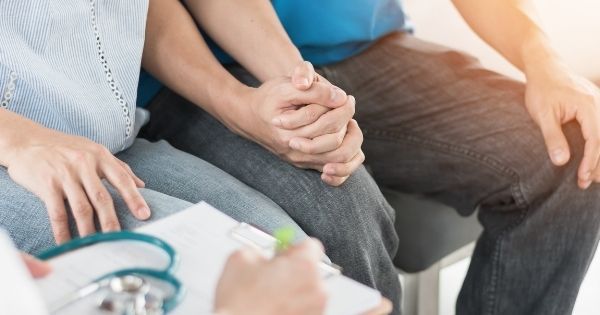Many women try to get pregnant after the age of 35. Many of them feel more up to the challenges of pregnancy and after being able to focus on their careers often have a more stable income. So, what are your chances of conceiving after 35? The older you and your partner are, the longer it might take to conceive. And you should know that there are certain challenges and risks linked to pregnancy in older women.
If you and your partner have tried to get pregnant for 6 months or longer, you should speak to your doctor about your fertility options. It can be more challenging to fall pregnant than when you were younger. Women are the most fertile in their twenties and generally, fertility begins to decline quicker after turning 30, and even more after turning 35.

Why Does Your Fertility Plummet When You Get Older?
At birth, all the eggs that you will ever have are in your eggs, between one and two million of them. Once you reach puberty, half of them will be left. As you age, the number of eggs will continue to decline. And keep in mind that your eggs also age with you, and older eggs do not fertilize as easily. But remember, you only require one to conceive.
The medical term for women over 35 or later trying to conceive is “advanced maternal age”. Age is a predominant factor that forecasts your capability to conceive. Your fertility begins to plummet at age thirty and will continue to drop until you’ve reached menopause. However, this does not mean that you can’t conceive a perfectly healthy baby after the age of 35.
The Odds of Conceiving After 35
Your fertility is at its peak during your twenties. Healthy women that age and that are trying to have a baby, have a one in four chance of conceiving during a single menstrual cycle. This means that 25 out of 100 women will get pregnant per month.
By age forty, the average healthy woman only has a five percent probability of falling pregnant per cycle.
Also bear in mind that the risk of miscarriage increases with age. The average forty year old woman has around 40% probability of losing the pregnancy in comparison to only 15% for a woman in her twenties.
Once you have reached the age of 45 and older, the chances of falling pregnant naturally is unlikely for the majority of women.
Are There Any Risks of Getting Pregnant After 35?
When you age, you are more susceptible than younger women to particular health conditions that can lead to complications before and during your pregnancy, which include:
- Trouble to conceive
- Pre-existing diabetes – diabetes before pregnancy
- Gestational diabetes – a type of diabetes during pregnancy
- High blood pressure
- Developing Pre-eclampsia
- Premature birth – when baby is born too soon
- Low birthweight
- Higher chance of multiples
- Increased chance of getting a C-section
- Higher chance of miscarriage
- Higher probability of stillbirth
Even if you manage to conceive, the older eggs are more probable to have abnormal chromosones that increase the risk of miscarriage. Women over 35 are more likely to have issues like uterine fibroids or endometriosis which make it harder to conceive. The quality of sperm also makes a difference. As men get older, their sperm tend to move slower and start losing their shape. Sperm quality drops substantially after the age of sixty.

What Are The Options For Women Older Than 35 Struggling To Conceive?
For some older women trying to conceive needs more than a bit of help from mother nature and more time. There are different types of reproductive medicine that could help the process along. For women under 35, fertility treatments might be recommended if they’ve been unsuccessful at conceiving for longer than a year. This window condenses to six months for women 35 and older. If you have pre-existing medical issues that could impact your chances of conceiving after 35, your GP may suggest that you get fertility assistance straight away. After doing fertility tests, and depending on the results, he might suggest:
- IVF (In vitro fertilization)
- Drugs that assist with stimulating egg production
- Freezing your eggs – If you want to get pregnant at some point, but are not yet ready, another choice you have is to freeze your egg for IVF treatment at a later stage. The quality of the embryos are more likely to be at their most fruitful when taken nearest to your most fertile stage. You can have your eggs tested at a clinic for viability, or the likelihood of them producing a healthy pregnancy.
- Embryo or egg donor – This is another option, where the clinic will utilize a healthy egg from a younger donor and fertilize it using your partner’s sperm or donated sperm, and then implant it into your uterus. This way you will be carrying and delivering your baby.
How Can you Improve Your Chances of Conceiving After 35?
The probability of you getting pregnant will be more favorable if you understand your menstrual cycle. An average menstrual cycle is 28 days, however it can differ from between 20 to 40 days for certain women.
If your cycle is standard, then you are likely to ovulate two weeks before the start of the next menstrual cycle. Therefore, you can work out the most opportune times to have sex.
It helps if you and your partner are both as healthy as possible. This could really boost your chances of conceiving after 35. Both of you can:
- Quit smoking, and steer clear from passive smoking
- Follow a healthy eating plan
- Maintain a healthy weight
- Avoid alcohol
- Check for any, and treat any sexually transmitted infections
When Should You Ask For Assistance?
If you are older than 35 and you have unsuccessfully tried to conceive for six months or longer, you must see a doctor. For women younger than 35, the usual advice is trying for at least a year before trying fertility options. Unless you are aware of medical issues like endometriosis or other medical conditions you have.
After Falling Pregnant
If you are pregnant and over 35, it is essential that you get excellent antenatal care. There are certain things that your doctor must be on the lookout for like high blood pressure, gestational diabetes, and the probability of multiples.
You might also want to consult with your midwife, gynie, or doctor about getting genetic counselling as well as tests like chorionic villus sampling and amniocentesis.
 Kaboutjie SA Mommy Blogs by Lynne Huysamen
Kaboutjie SA Mommy Blogs by Lynne Huysamen





Is it only the mother who is at risk or the baby as well after conceiving birth at 35 or up?
I believe there is more risk of a variety of complications that can affect mom and baby.
I fell pregnant at 35 goin on 36 so I gave birth to my bby boy at 36yrs it was scary as I was going to government so they told me the risks I was taking the normal vitamins but the one thing that reali helped me is prayer and my faith in God..the pregnancy went well the labour was a bit hectic cos my first baby was a scheduled Caesar At a private hospital..I had alot of stitches for the normal birth but thru it Al everything went well thru prayer and faith.
I’m turning 35 in 13 days and I’m still scared of getting pregnant again after my child was diagnosed with Thanatophoric Dysplasia ans never saw the light of day.I can’t risk it.
I’m so sorry to hear about your struggles Lesego!
I will be 34 next month, would love another child, feels like the universe is against us though. I have told my husband next year is our last chance to have another as I’m too scared to go after 35..its a tough situation to be in.
I pray that if we do decide to have another child it won’t be too late. Thank you for the above.
Thanks for this info.